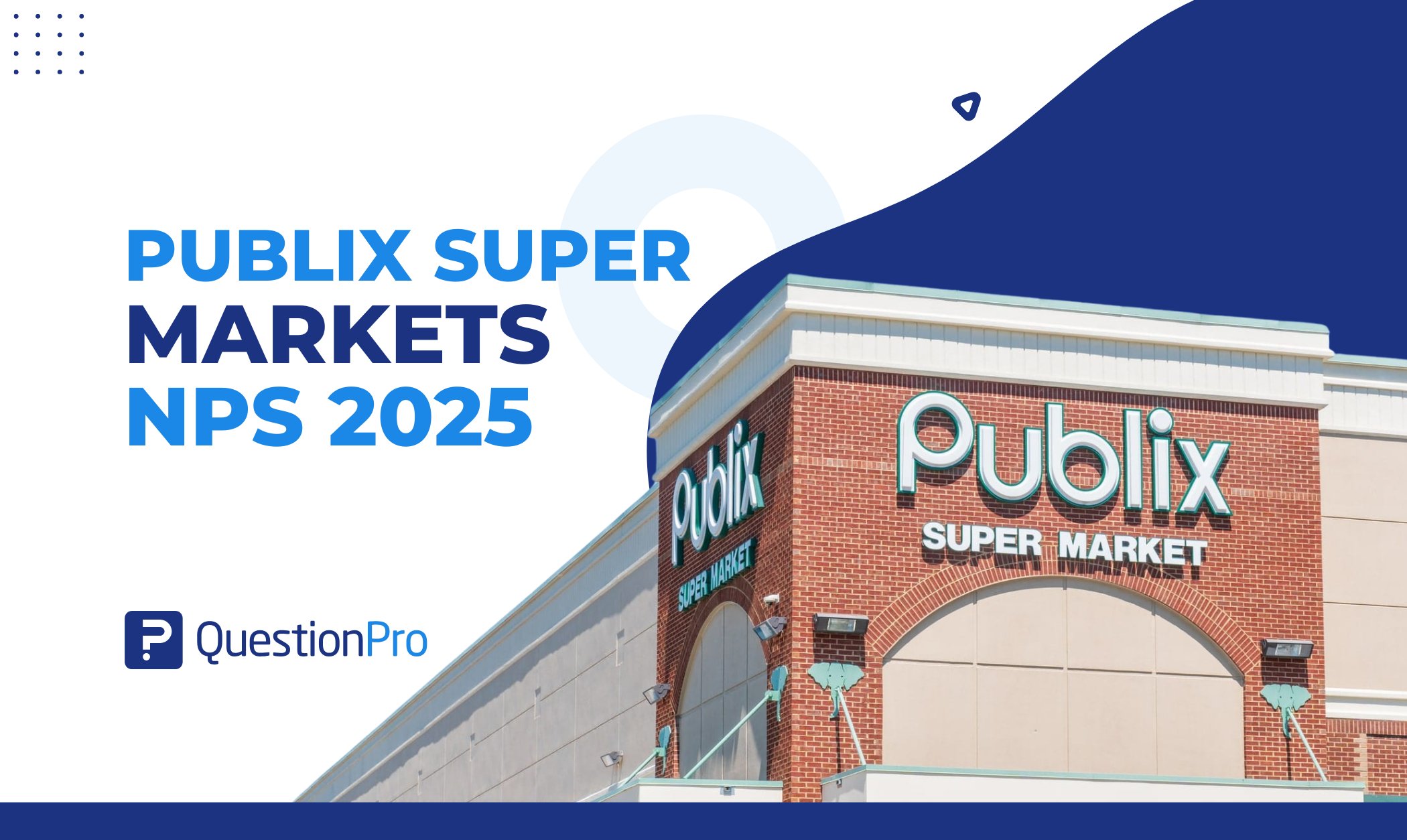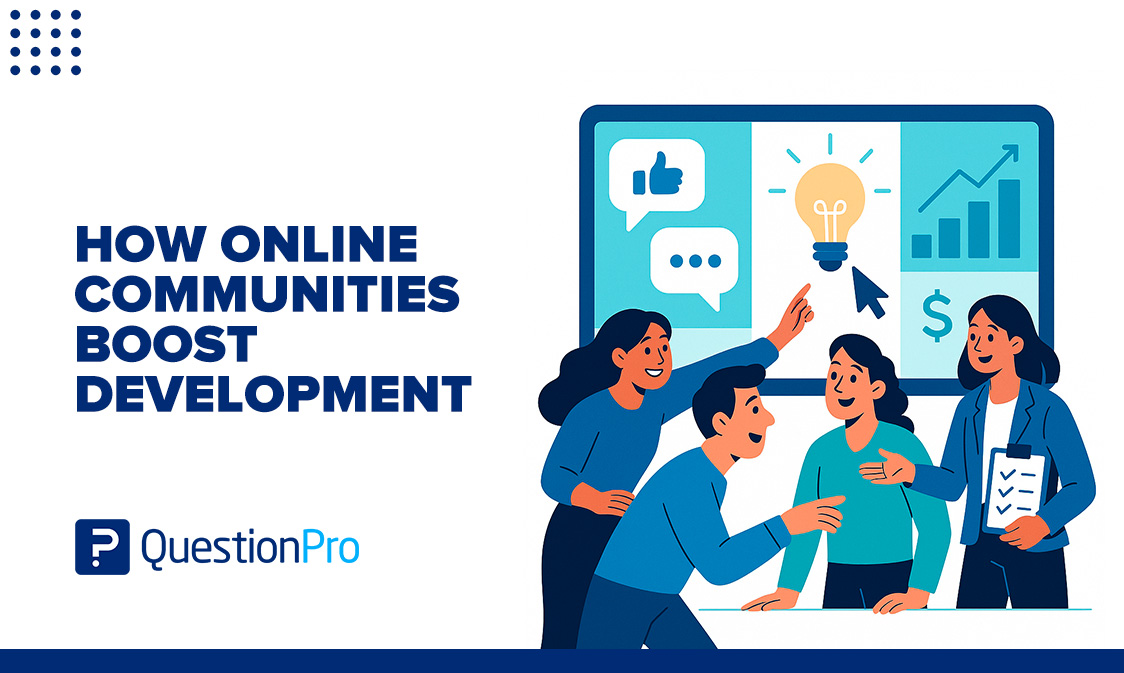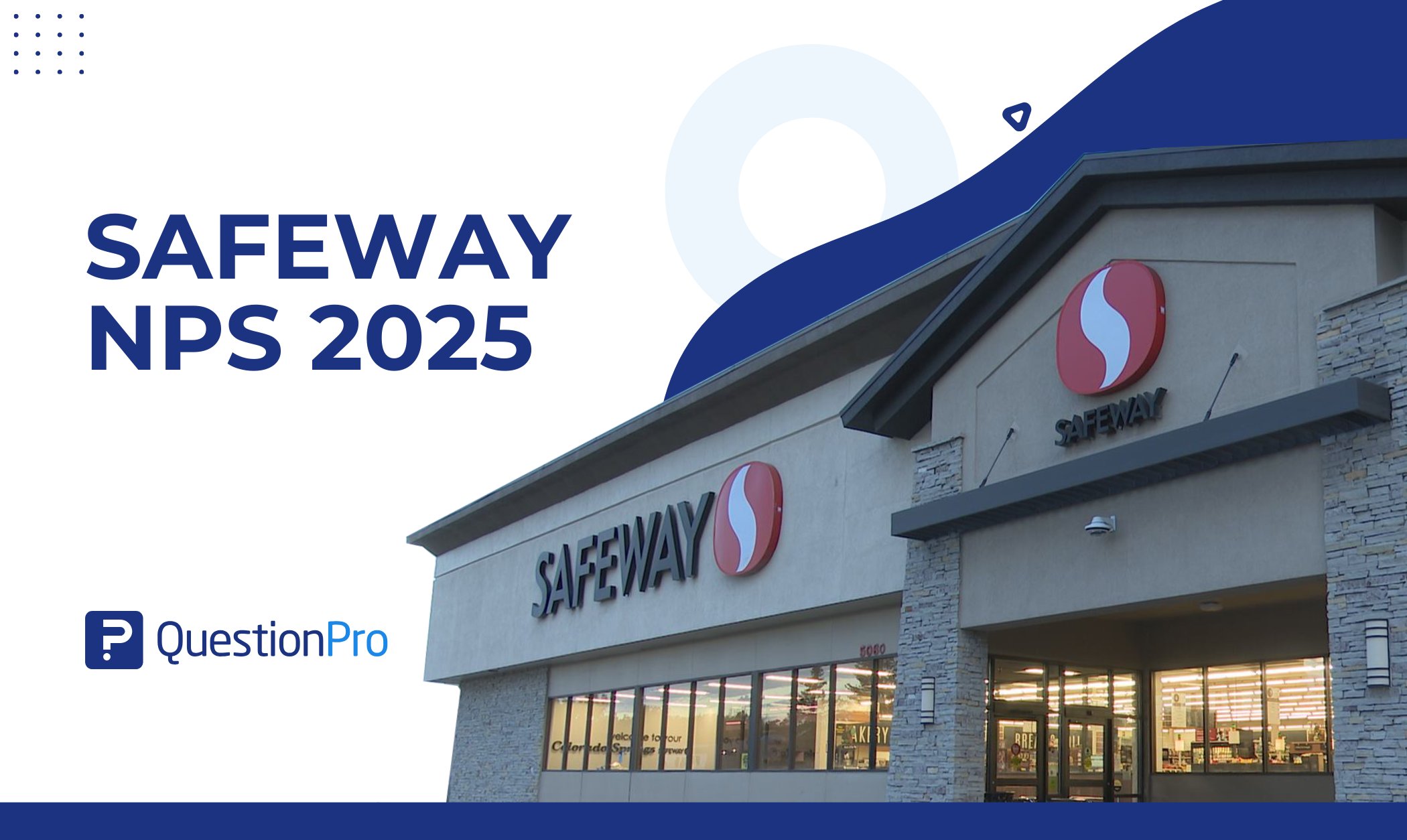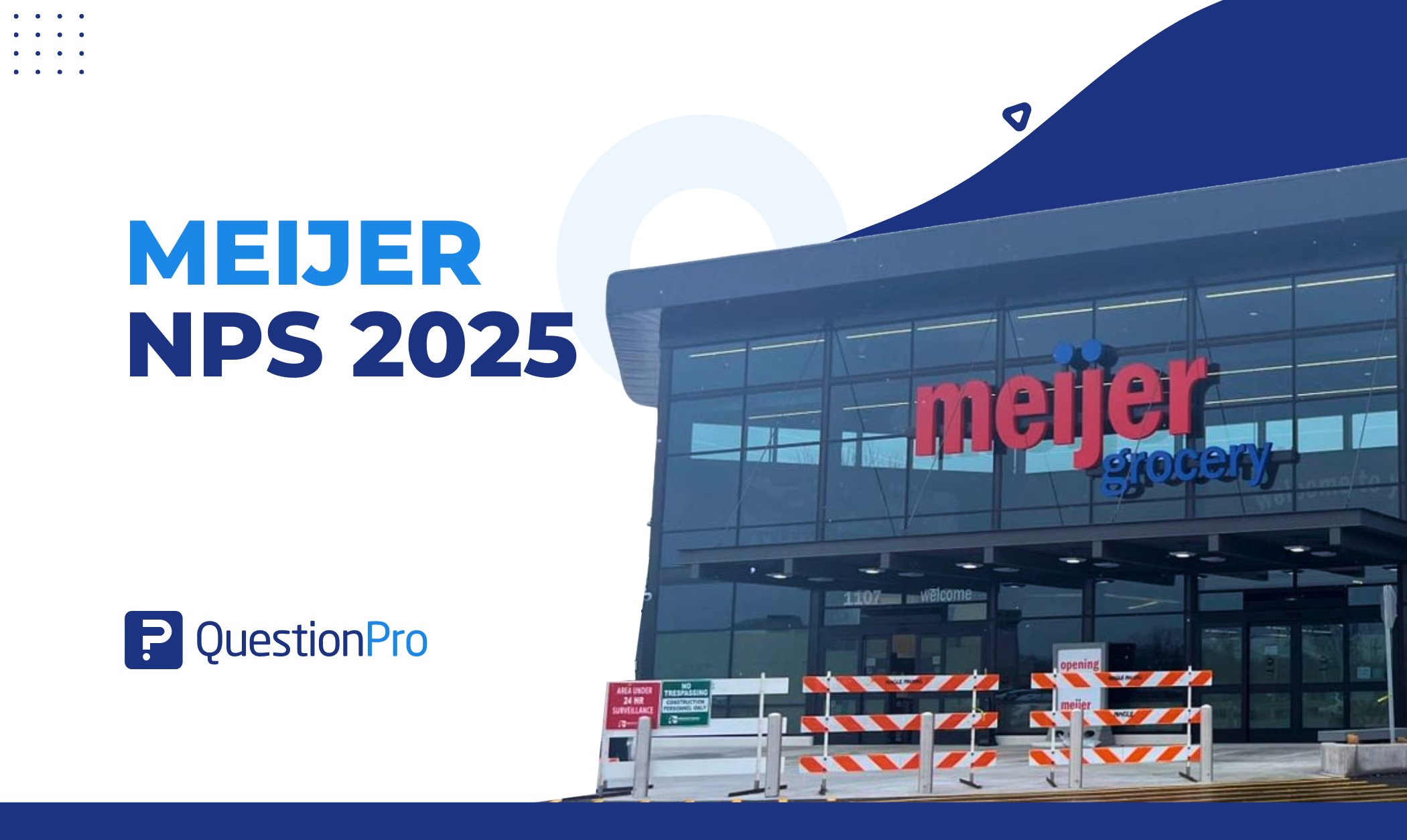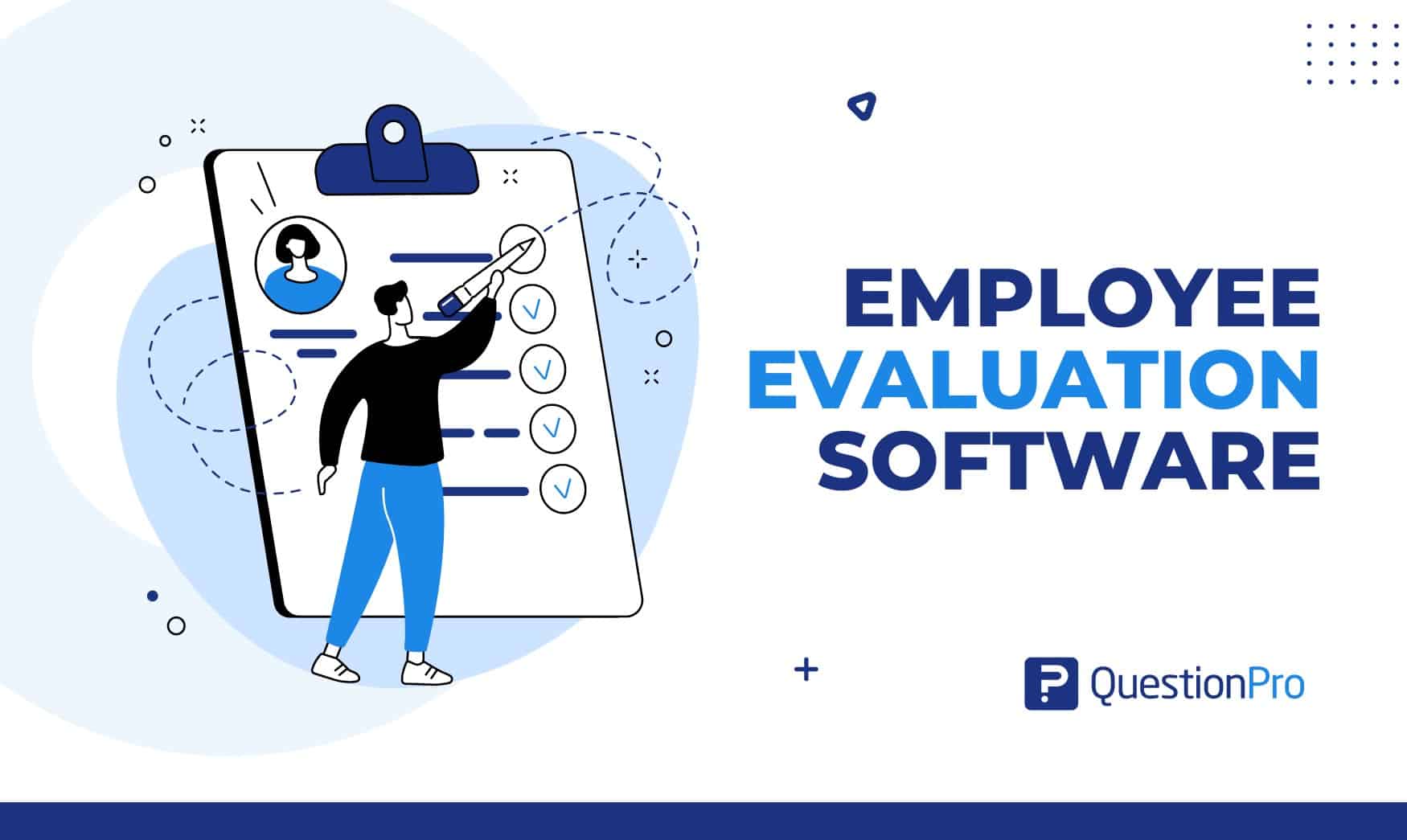
Organizations strive for efficiency and effectiveness in every aspect of their operations. One critical area that often determines an organization’s success is its workforce. Companies rely on robust systems and processes for Employee Evaluation Software to ensure optimal performance and growth.
Employee evaluation software has transformed how organizations manage their performance appraisal process. This blog will teach us about the software’s intricacies, profound significance, selection criteria, top tools, and substantial benefits.
What is an Employee Evaluation Software?
Employee Evaluation Software, or Performance Management Software, is a digital tool designed to facilitate and automate the assessment of employee performance reviews within an organization. It allows users to provide feedback and conduct performance reviews.
It is a centralized platform where managers, HR professionals, and employees can effectively
- Manage performance evaluations,
- Set goals and
- Track progress.
Employee Evaluation Software aims to improve organizational performance by fostering transparency, accountability, and employee engagement. By automating and standardizing performance management processes, these tools help eliminate biases and ensure evaluation fairness.
Employee performance review software automates and streamlines the evaluation process, ensuring fair and objective assessments. They also empower employees to take ownership of their development and contribute effectively to the organization’s success.
The Importance of Having an Unbiased Employee Evaluation
It’s crucial to regularly evaluate the employee performance management process to ensure its effectiveness and alignment with organizational goals. Having an unbiased employee evaluation system is crucial for several reasons:
- Fairness: Unbiased evaluations ensure that all employees are treated fairly and equally. This fosters a positive work environment and helps maintain morale among the workforce.
- Merit-based Recognition: Objective evaluations allow recognition and rewards based on performance rather than personal biases or favoritism. This encourages employees to strive for excellence and contributes to a meritocratic culture.
- Development Opportunities: Unbiased evaluations provide valuable feedback to employees about their strengths and areas for improvement. This helps employees understand their performance relative to expectations and provides them with opportunities for growth and development.
- Retention and Engagement: Employees who perceive the evaluation process as fair and objective are likelier to be engaged and committed to their work. This, in turn, increases employee retention rates and reduces turnover, saving the organization time and resources associated with hiring and training new staff.
- Legal Compliance: Biased evaluations can lead to legal issues such as discrimination or wrongful termination claims. Implementing an unbiased evaluation system helps organizations mitigate these risks and ensures compliance with relevant employment laws and regulations.
- Enhanced Team Dynamics: Fair evaluations contribute to a positive team dynamic by reducing resentment and distrust among team members. When everyone believes they are evaluated based on their performance rather than personal factors, it promotes team collaboration and cooperation.
- Organizational Performance: Ultimately, unbiased evaluations contribute to overall organizational performance by ensuring that employees are placed in roles that align with their skills and abilities. This optimizes productivity and efficiency, leading to better business outcomes.
Employee retention is critical to any successful business. So learn about Top 15 Employee Retention Software in 2025
Reasons for Selecting the Best Employee Evaluation Software
Choosing the right performance management tool can significantly enhance organizational productivity and employee development. So selecting the best employee evaluation software is crucial for several reasons:
Efficiency and Time Savings
A robust evaluation software streamlines the entire evaluation process, saving time for employees and managers. Automated reminders, built-in templates, and centralized data management reduce administrative burdens and increase efficiency.
Accuracy and Consistency
With standardized evaluation forms and criteria, the software helps ensure that evaluations are fair, consistent, and based on objective metrics. This minimizes biases and discrepancies in assessment across different managers or departments.
Enhanced Feedback and Development
Good evaluation software facilitates regular employee feedback and coaching opportunities. Features like 360-degree feedback, goal setting, and performance tracking empower employees to improve their skills and career progress.
Data-Driven Decision Making
The software provides valuable insights into individual and team performance through analytics and reporting features. This data-driven approach enables managers to make informed decisions about
- Talent management,
- Training needs,
- Promotions and
- Succession planning.
Improved Employee Engagement and Satisfaction
Transparent and fair evaluation processes increase employee engagement and job satisfaction. When employees feel recognized and valued for their contributions, they are more motivated to perform at their best and remain loyal to the organization.
Compliance and Risk Mitigation
By adhering to industry standards for data security and compliance, the software helps mitigate risks associated with legal issues, such as discrimination or wrongful termination claims. Compliance features ensure that relevant regulations, such as GDPR or HIPAA, handle sensitive employee data.
Scalability and Adaptability
The best evaluation software can scale with your organization’s growth and adapt to changing needs and priorities. Whether you’re a small startup or a large enterprise, scalable software accommodates increasing numbers of users, departments, and evaluation cycles without sacrificing performance or usability.
Integration with HR Systems
Seamless integration with existing HRIS (Human Resources Information Systems) or other relevant software systems enhances data accuracy and workflow efficiency.
Integration guarantees that information from employee evaluations is in sync with payroll, the performance management program, and talent development, among other HR procedures.
Support and Training
Reliable customer support and comprehensive training resources from the software vendor are essential for successful implementation and ongoing usage. Access to tutorials, documentation, and responsive customer service helps maximize the software’s value for your organization.
Cost-Effectiveness and ROI
While the initial investment in evaluation software may vary, selecting the best software ensures a positive return on investment (ROI) over time. Cost-effective solutions that align with your organization’s budget constraints offer long-term benefits regarding improved
- Productivity,
- Employee retention and
- Organizational performance.
15 Best Employee Evaluation Software
Various employee evaluation software solutions offer multiple features and capabilities to meet the needs of different organizations.
When selecting the best option for your organization, consider factors such as pricing, ease of use, customization options, integration capabilities, and overall fit with your organization’s goals and requirements.
Here are 15 of the best described below:
1. QuestionPro Workforce
QuestionPro Workforce is a comprehensive employee evaluation solution that offers 360-degree feedback, customizable evaluation forms, goal setting, performance analytics, and integration capabilities.
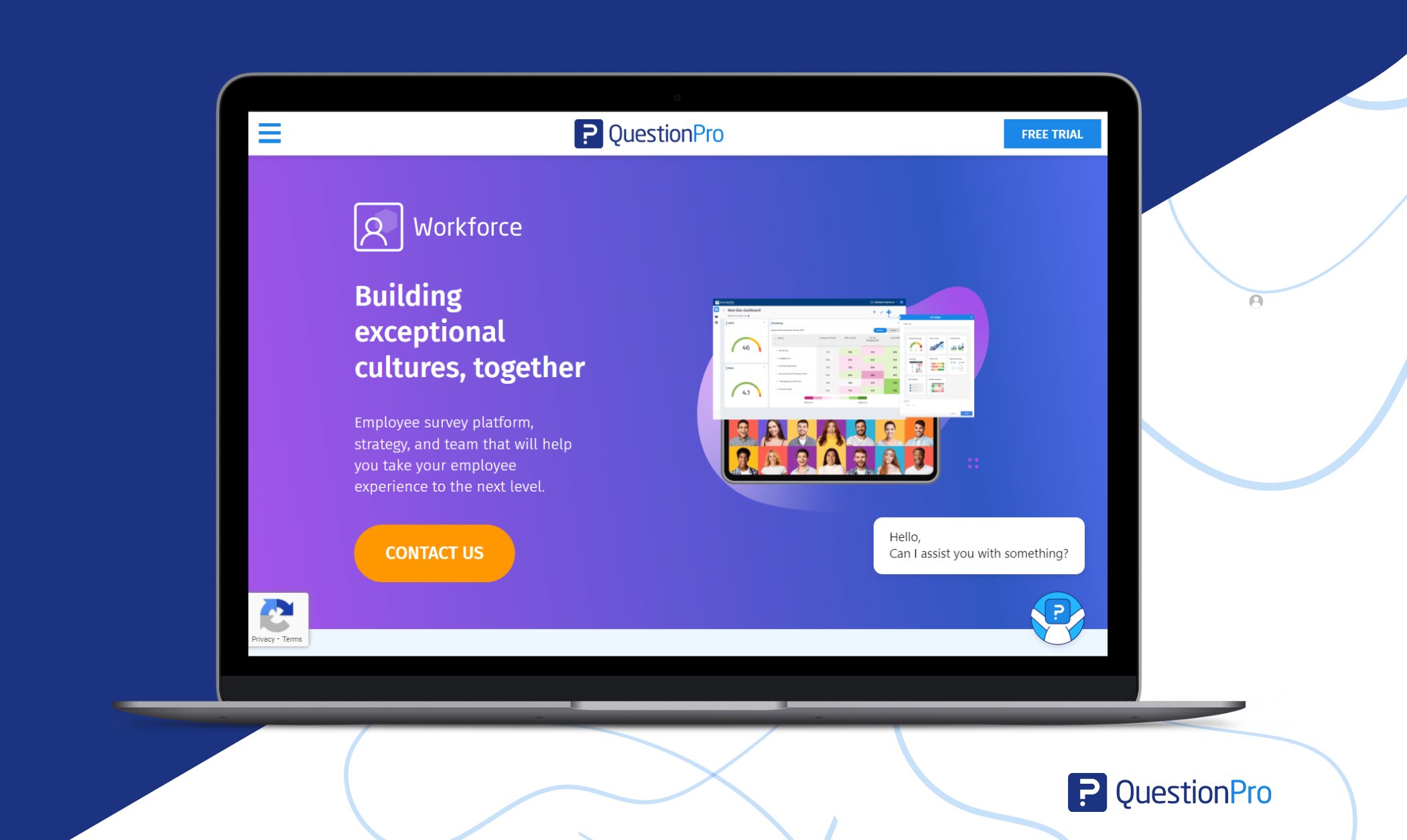
Features:
- 360-degree feedback.
- Customizable evaluation forms.
- Automated evaluation workflows.
- Goal setting and tracking.
- Performance analytics and reporting.
- Employee engagement surveys.
- Integration with HRIS.
- Security and compliance features.
- Training and support resources.
Pros:
- Comprehensive features for employee evaluation.
- User-friendly interface.
- Integration capabilities with other systems.
- Strong security and compliance measures.
- Dedicated customer support.
Cons:
- May be costly for small businesses.
- Learning curve for new users.
2. Trakstar
Trakstar is an employee performance management software offering features like goal management, performance reviews, and feedback tools.
Features:
- Goal management.
- Performance reviews.
- Feedback tools.
- 360-degree feedback.
- Employee self-assessments.
- Performance analytics.
Pros:
- Intuitive interface.
- Customizable evaluation forms.
- Robust reporting capabilities.
- Integration with HR systems.
- Responsive customer support.
Cons:
- Limited features compared to other platforms.
- Pricing may not be suitable for all budgets.
3. Culture Amp
Culture Amp is an employee feedback and analytics platform that helps organizations measure and improve employee engagement, performance, and retention.
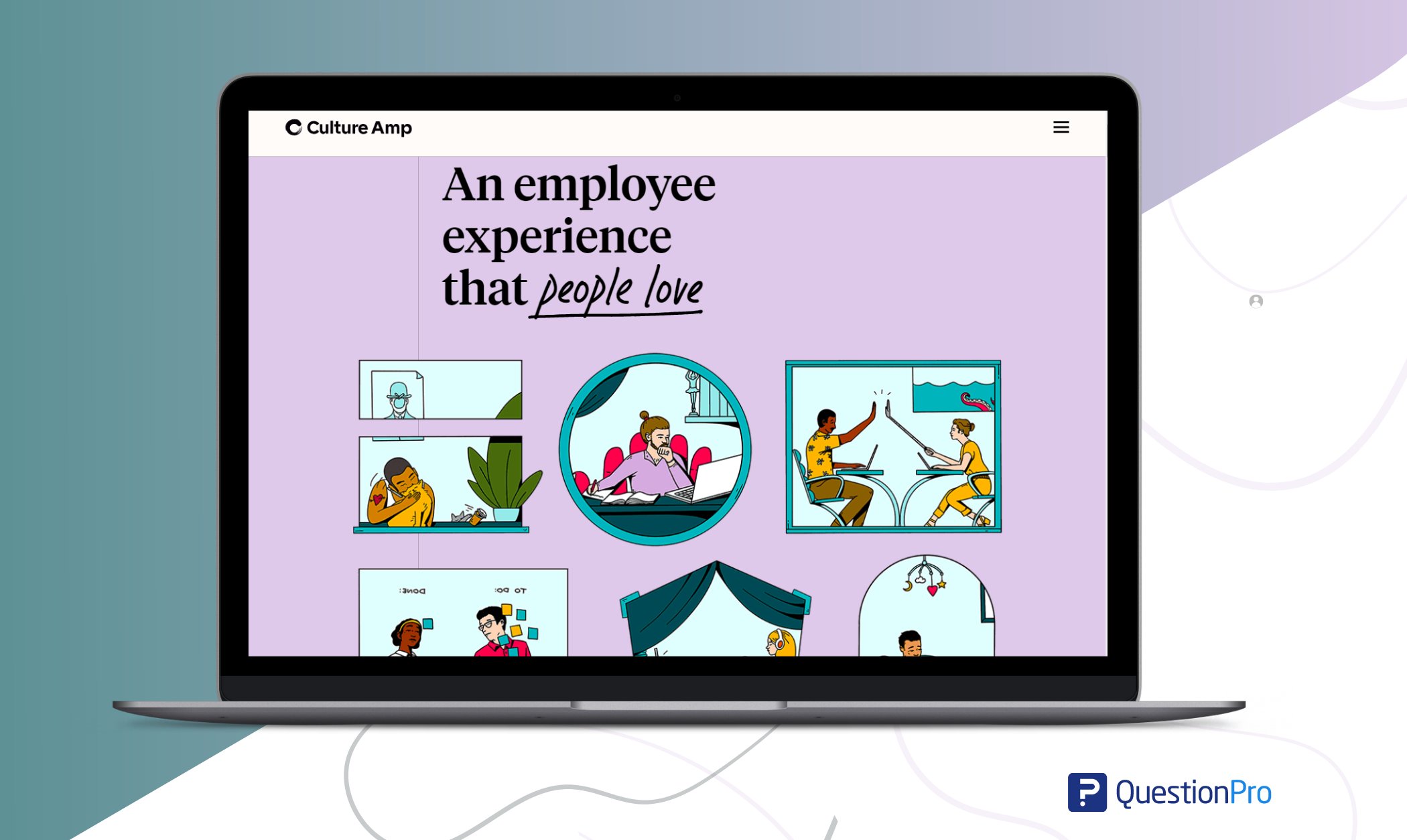
Features:
- Employee feedback surveys.
- Performance reviews.
- Pulse surveys.
- Engagement analytics.
- Action planning tools.
- Customizable dashboards.
Pros:
- Focus on employee engagement and culture.
- User-friendly interface.
- Powerful analytics and reporting.
- Actionable insights for improvement.
- Scalable for organizations of all sizes.
Cons:
- Pricing may be higher for some organizations.
- Setup and implementation may require assistance.
4. BambooHR
BambooHR is an HR software platform with features for employee evaluation, performance management, and HR administration.
Features:
- Performance reviews.
- Goal setting and tracking.
- Employee self-assessments.
- Customizable evaluation forms.
- Reporting and analytics.
- Integration with other HR systems.
Pros:
- All-in-one HR solution.
- Easy-to-use interface.
- Customizable to fit specific needs.
- Good customer support.
Cons:
- Limited advanced features compared to specialized software.
- Pricing may not be suitable for all budgets.
5. Lattice
Lattice is a performance management platform offering goal setting, performance reviews, feedback, and employee engagement features.
Features:
- Goal setting and tracking.
- Performance reviews.
- Feedback tools.
- Pulse surveys.
- Employee recognition.
- Performance analytics.
Pros:
- Modern interface.
- Focus on employee engagement and development.
- Customizable performance reviews.
- Integration with other HR systems.
Cons:
- Higher pricing compared to some competitors.
- Limited customization options for smaller organizations.
6. 15Five
15Five is a performance management software that enables continuous feedback, goal setting, and pulse surveys to improve employee engagement and productivity.
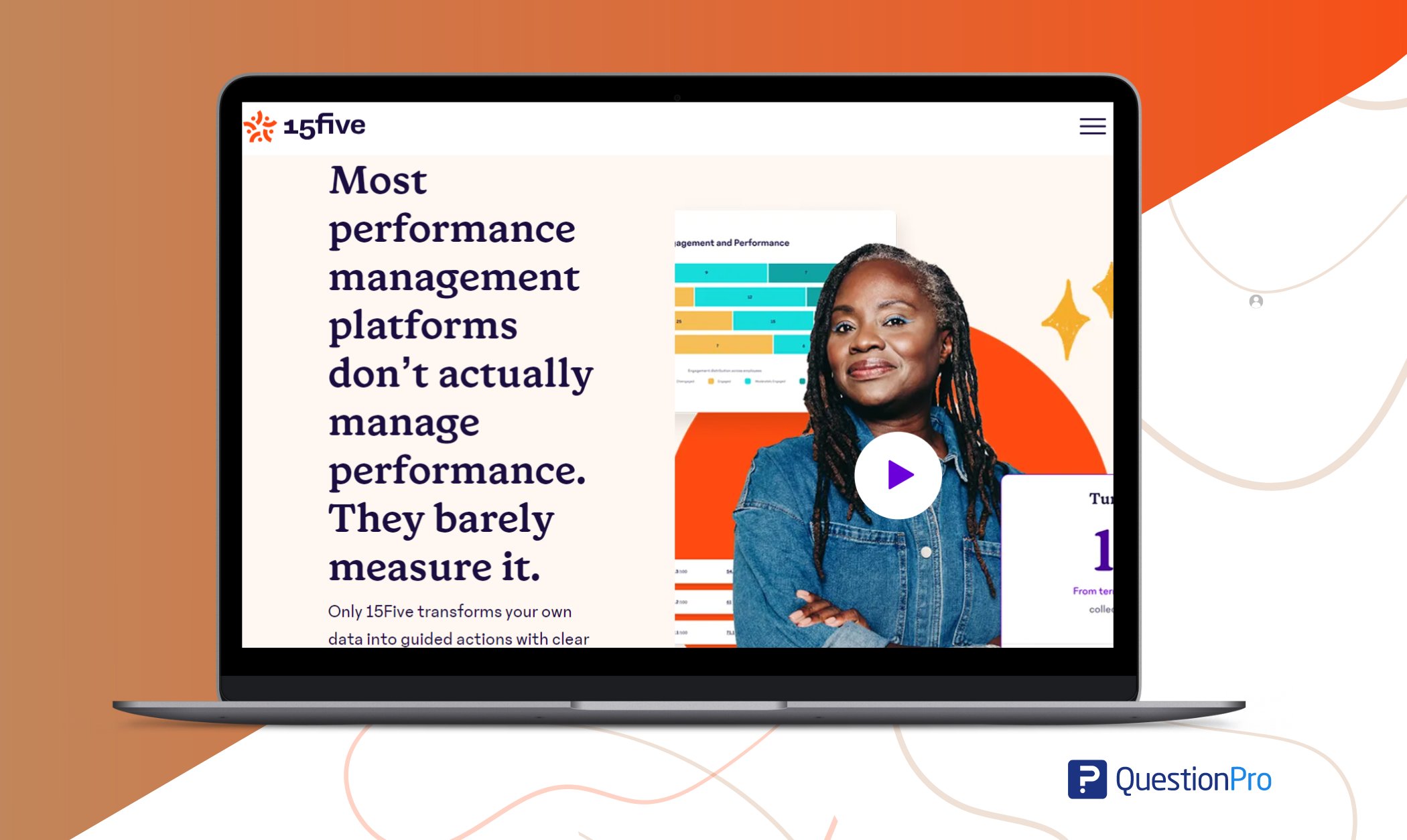
Features:
- Continuous feedback
- Goal setting and tracking
- Pulse surveys
- Performance reviews
- Employee recognition
- Analytics and reporting
Pros:
- User-friendly interface
- Emphasis on continuous feedback
- Integration with other tools
- Flexible pricing plans
Cons:
- Some users may find the interface overwhelming
- Limited customization options
7. PerformYard
PerformYard is a performance management platform that offers features for goal management, performance reviews, feedback, and reporting.
Features:
- Goal management
- Performance reviews
- Feedback tools
- 360-degree feedback
- Reporting and analytics
- Integration capabilities
Pros:
- Easy-to-use interface
- Customizable evaluation forms
- Strong reporting capabilities
- Integration with HRIS and other systems
Cons:
- Pricing may not be suitable for all budgets
- Limited advanced features compared to some competitors
8. Eloomi
Eloomi is a learning and performance management platform that offers features for goal setting, performance reviews, feedback, and employee development.
Features:
- Goal setting and tracking
- Performance reviews
- Feedback tools
- Learning management system
- Analytics and reporting
- Integration capabilities
Pros:
- Comprehensive features for performance management and learning
- Intuitive interface
- Customizable to fit specific needs
- Good customer support
Cons:
- Higher pricing compared to some competitors
- Learning curve for new users
9. Connecteam
Connecteam is an all-in-one employee management platform with communication, scheduling, task management, and performance evaluation features.
Features:
- Performance evaluations
- Goal setting and tracking
- Feedback tools
- Employee engagement surveys
- Communication tools
- Task management
Pros:
- All-in-one solution for employee management
- Mobile-friendly interface
- Affordable pricing plans
- Customizable evaluation forms
Cons:
- Limited advanced features compared to specialized software
- May not be suitable for large organizations with complex needs
10. ClickUp
ClickUp is a project management platform that offers task management, goal setting, collaboration, and performance tracking features.
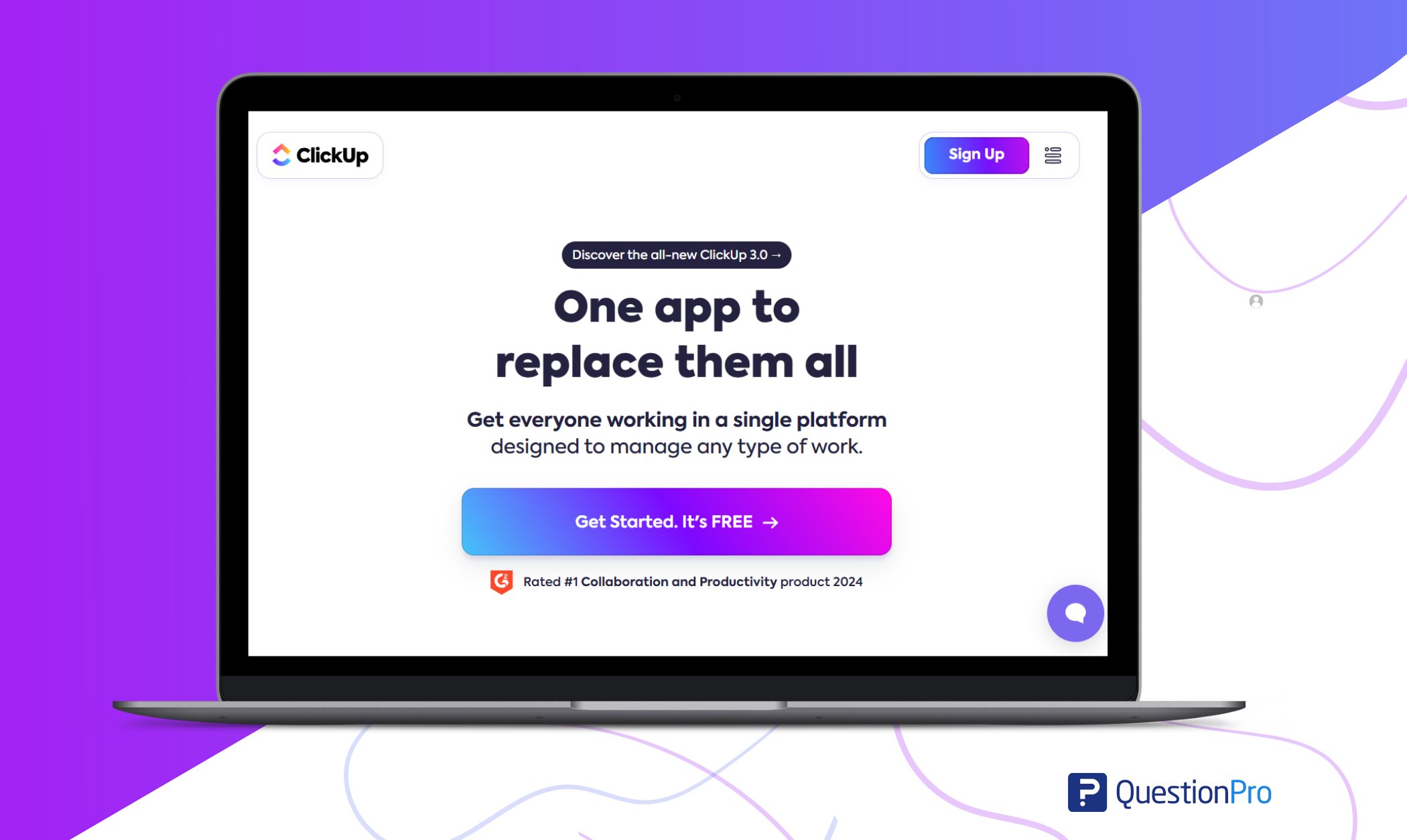
Features:
- Goal setting and tracking.
- Task management.
- Collaboration tools.
- Reporting and analytics.
- Integration capabilities.
- Performance tracking.
Pros:
- Versatile platform for project management and performance tracking.
- Customizable to fit various workflows.
- Affordable pricing plans.
- Integration with other tools and platforms.
Cons:
- May be overwhelming for users looking specifically for performance management features.
- Learning curve for new users.
11. Leapsome
Leapsome is an employee feedback and performance management platform that offers features for continuous feedback, goal setting, performance reviews, and employee engagement surveys.
Features:
- Continuous feedback.
- Goal setting and tracking.
- Performance reviews.
- Employee engagement surveys.
- Feedback tools.
- Reporting and analytics.
Pros:
- Emphasis on employee feedback and engagement.
- User-friendly interface.
- Comprehensive features for performance management.
- Integration capabilities.
Cons:
- Higher pricing compared to some competitors.
- Limited customization options for smaller organizations.
12. Workday
Workday is an HR software platform with HR administration, payroll, talent management, and performance evaluation features.
Features:
- Performance reviews.
- Goal setting and tracking.
- Talent management.
- Reporting and analytics.
- Integration capabilities.
- Learning management system.
Pros:
- Comprehensive suite of HR and performance management features.
- User-friendly interface.
- Scalable for organizations of all sizes.
- Integration with other systems.
Cons:
- Higher pricing compared to some competitors.
- Implementation may require assistance.
13. Workhuman
Workhuman is a recognition and performance management platform that offers features for employee recognition, performance reviews, feedback, and employee surveys.
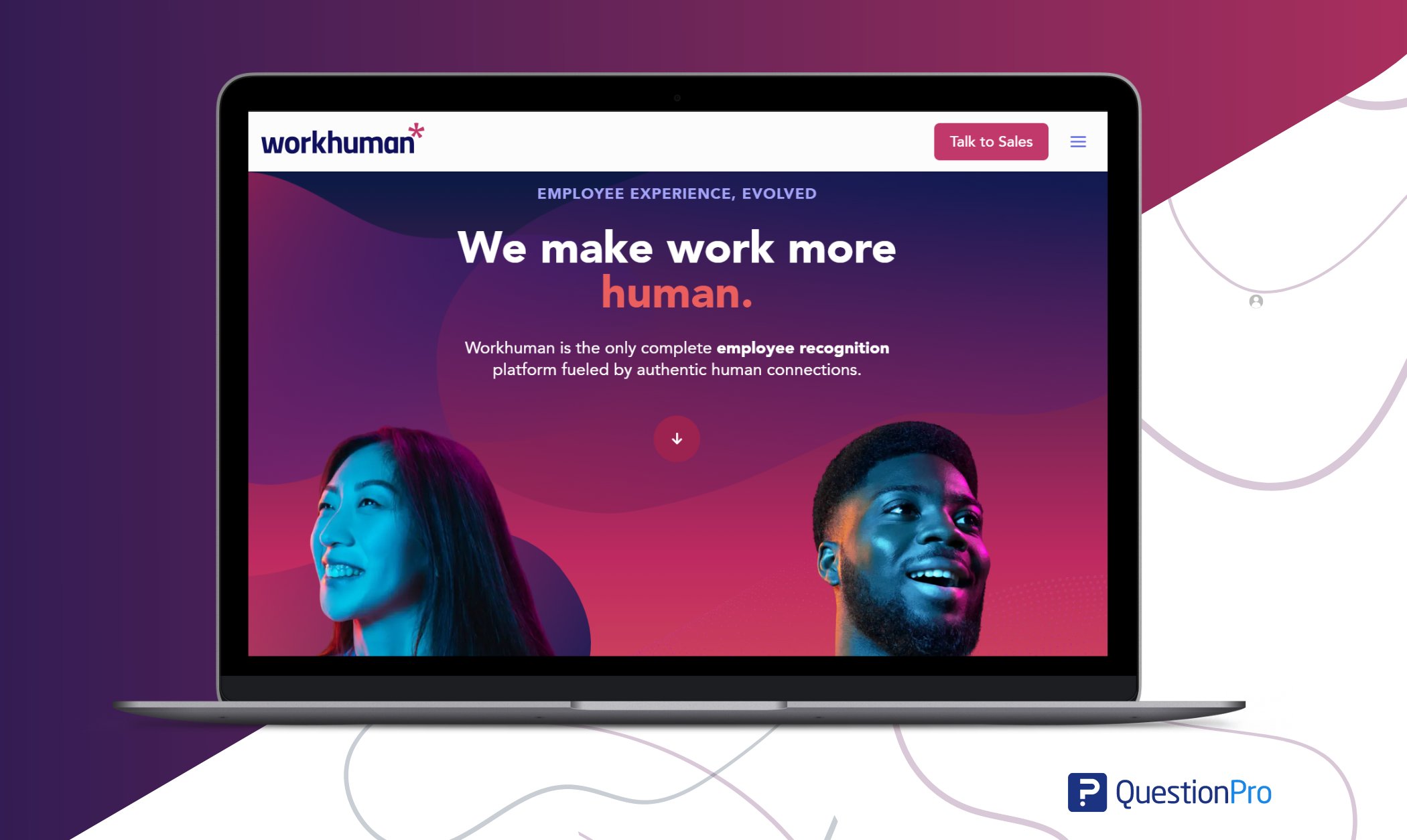
Features:
- Employee recognition.
- Performance reviews.
- Feedback tools.
- Employee surveys.
- Reporting and analytics.
- Integration capabilities.
Pros:
- Focus on employee recognition and appreciation.
- User-friendly interface.
- Customizable features.
- Integration with other HR systems.
Cons:
- Higher pricing compared to some competitors.
- Limited customization options.
14. Motivosity
Motivosity is an employee recognition and engagement platform that offers features for peer-to-peer recognition, performance tracking, and employee feedback.
Features:
- Peer-to-peer recognition.
- Performance tracking.
- Employee feedback tools.
- Goal setting and tracking.
- Reporting and analytics.
- Integration capabilities.
Pros:
- Focus on fostering a positive company culture through recognition.
- User-friendly interface.
- Customizable features.
- Integration with other HR systems.
Cons:
- Higher pricing compared to some competitors.
- May not have as many advanced performance management features.
15. ClearCompany
ClearCompany is a talent management platform with features for applicant tracking, onboarding, performance management, and employee engagement.
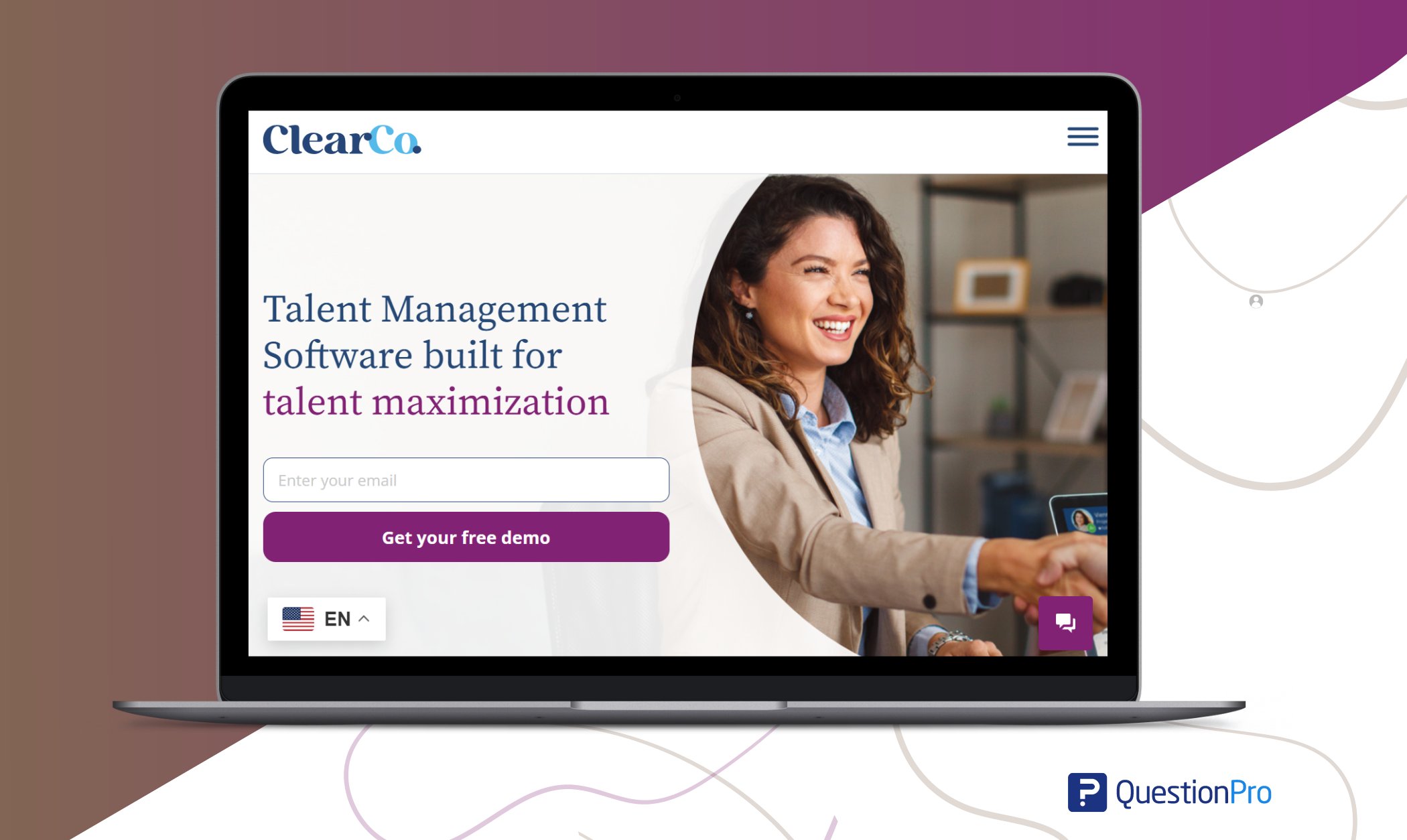
Features:
- Performance reviews.
- Goal setting and tracking.
- Applicant tracking system.
- Onboarding tools.
- Reporting and analytics.
- Integration capabilities.
Pros:
- Comprehensive suite of talent management features.
- User-friendly interface.
- Customizable to fit specific needs.
- Integration with other HR systems.
Cons:
- Higher pricing compared to some competitors.
- Implementation may require assistance.
Learn about our Company Culture Software
Improve Your Organization’s Culture With Employee Evaluation Software
Implementing employee evaluation software can significantly contribute to improving your organization’s culture in several ways:
Transparency and Fairness
The software helps ensure fairness and consistency in assessing employee performance by providing a structured and transparent evaluation process. This fosters a culture of trust and transparency, where employees feel confident that their contributions are recognized and evaluated relatively.
Continuous Feedback and Development
Evaluation software facilitates ongoing feedback and coaching between managers and employees. Regular check-ins, goal setting, and performance discussions encourage a culture of continuous learning and development, where employees are supported in their professional growth and career advancement.
Recognition and Appreciation
The software lets managers promptly acknowledge and appreciate employees’ achievements and contributions. Whether through formal evaluations or informal feedback, recognizing employees’ efforts reinforces a culture of appreciation and recognition, boosting morale and motivation.
Alignment with Organizational Values
Evaluation software allows organizations to align performance criteria and goals with their core values and objectives.
By reinforcing behaviors and actions that reflect the organization’s values, the software helps cultivate a culture where employees are committed to achieving shared goals and upholding shared principles.
Empowerment and Accountability
Empowering employees with self-assessment tools and access to their performance data promotes a sense of ownership and accountability for their work. When employees understand how their performance contributes to organizational success, they are more motivated to take initiative and excel in their roles.
Collaboration and Communication
Evaluation software facilitates communication and collaboration across teams and departments. Features such as 360-degree feedback and peer reviews encourage open communication and constructive dialogue, strengthening relationships and fostering a collaborative work environment.
Data-Driven Decision Making
The software provides valuable insights into individual and team performance through analytics and reporting features. By leveraging data-driven decision-making, managers can identify
- Trends,
- Address performance gaps,
- Allocate resources effectively,
- Driving continuous improvement and innovation.
Compliance and Risk Management
Implementing evaluation software helps ensure compliance with legal and regulatory requirements related to performance management.
By standardizing evaluation processes and documenting performance feedback, organizations mitigate risks associated with legal issues, such as discrimination or wrongful termination claims.
Employee Engagement and Retention
A positive evaluation experience, characterized by transparent communication, recognition, and growth opportunities, enhances employee engagement and retention. When employees feel valued, supported, and empowered to succeed, they are more likely to remain committed to the organization and its mission.
Cultural Transformation
Over time, the consistent use of evaluation software can contribute to a cultural transformation within the organization. By reinforcing desired behaviors, fostering open communication, and promoting accountability and collaboration, the software helps shape a culture where employees thrive, and the organization achieves its goals.
Benefits of Employee Evaluation Software
Employee Evaluation Software offers numerous benefits to organizations seeking to enhance their performance management processes. Some key benefits include:
- Improved Performance: Clear goal-setting, regular feedback, and data-driven evaluations facilitate employee growth and development, improving organizational performance.
- Streamlined Processes: Automating evaluation workflows reduces administrative burden, saves time, and ensures timely completion of the performance review process, increasing overall efficiency.
- Objective Assessments: Standardized evaluation criteria help minimize biases and subjectivity in performance evaluations, ensuring fair and consistent employee assessments.
- Data-Driven Insights: Analytics dashboards provide valuable insights into workforce performance trends, allowing managers to make informed decisions and implement targeted interventions to address areas for improvement.
- Enhanced Employee Engagement: Regular feedback and recognition foster a culture of engagement and empowerment, boosting morale, motivation, and employee retention rates.
- Promotion of Accountability: Transparent performance evaluation processes encourage accountability among employees, as they know the expectations and standards they need to meet.
- Facilitation of Development Planning: Employee Evaluation Software supports the creation of personalized development plans, helping employees identify strengths, weaknesses, and growth opportunities to advance their careers within the organization.
- Alignment with Organizational Goals: By linking individual performance goals to broader organizational objectives, Employee Evaluation Software ensures that employee efforts are directed toward achieving strategic priorities and driving organizational success.
How QuestionPro Workforce Can Help in Employee Evaluation
QuestionPro Workforce is a comprehensive employee evaluation solution that offers a range of features and capabilities to streamline the evaluation process and enhance employee engagement and development. Here’s how QuestionPro Workforce can help in employee evaluation:
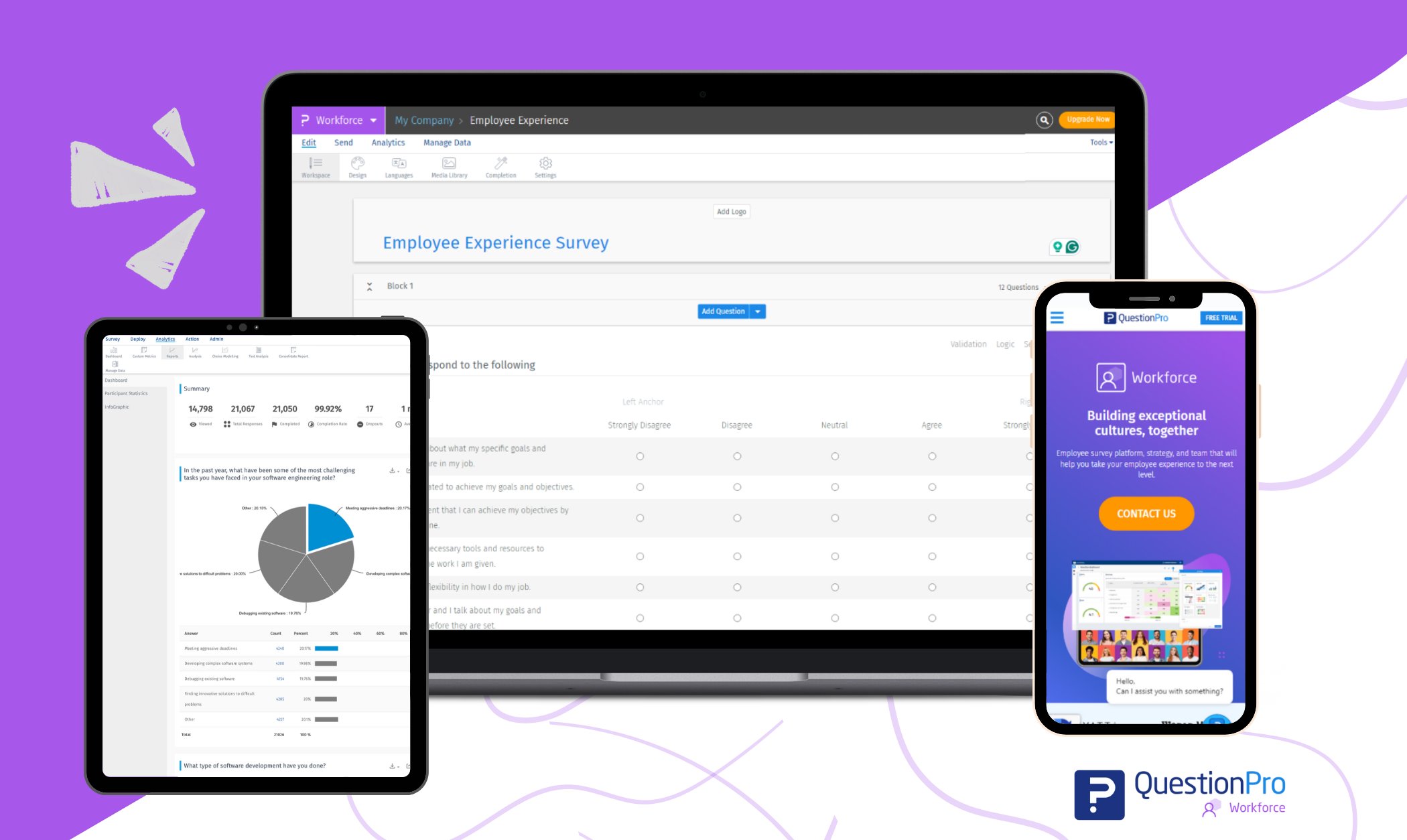
1. 360-Degree Feedback
QuestionPro Workforce facilitates 360-degree feedback, allowing employees to receive input from multiple sources, including managers, peers, subordinates, and external stakeholders. This comprehensive feedback provides a well-rounded assessment of an employee’s
- Performance,
- Strengths and
- Sreas for improvement.
2. Customizable Evaluation Forms
The platform allows organizations to create customized evaluation forms tailored to their specific performance criteria and goals. Administrators can design evaluation forms with different question types, rating scales, and open-ended questions to gather meaningful insights into employee performance evaluations.
3. Automated Evaluation Workflows
QuestionPro Workforce automates the evaluation process with customizable workflows, ensuring that evaluations are conducted efficiently and on schedule.
Automated reminders and notifications prompt employees and managers to complete assessments, reducing administrative burden and ensuring timely feedback.
4. Goal Setting and Tracking
The platform supports goal setting and tracking, enabling employees and managers to set SMART goals (Specific, Measurable, Achievable, Relevant, Time-bound) and monitor progress over time. Clear goals aligned with organizational objectives help employees stay focused and motivated to achieve their targets.
5. Performance Analytics and Reporting
QuestionPro Workforce provides robust analytics and reporting features, allowing administrators to analyze performance data and identify trends and patterns. Customizable reports offer individual and team performance insights, facilitating data-driven decision-making and performance reviews.
6. Employee Engagement Surveys
In addition to performance evaluations, QuestionPro Workforce offers employee engagement surveys to measure employee satisfaction, morale, and overall engagement. Regular surveys help organizations gauge employee sentiment and identify workplace improvement areas.
7. Integration Capabilities
The platform seamlessly integrates with other HRIS (Human Resources Information Systems) and third-party applications, ensuring data consistency and workflow efficiency. Integration with HRIS allows for seamless data synchronization and enhances the overall employee experience.
8. Security and Compliance
QuestionPro Workforce prioritizes data security and compliance with industry standards and regulations. Features such as data encryption, role-based access controls, and compliance with GDPR and HIPAA ensure that sensitive employee data is protected and handled securely.
9. Training and Support
The platform offers comprehensive training resources and dedicated customer support to help organizations maximize the value of QuestionPro Workforce. Access to tutorials, documentation, and responsive customer service ensures a smooth implementation and ongoing platform usage.
10. Scalability and Flexibility
QuestionPro Workforce is scalable and flexible, catering to organizations of all sizes and industries. Whether a small startup or a large enterprise, the platform can adapt to your changing needs and grow with your organization over time.
Conclusion
Employee Evaluation Software has become an indispensable tool for organizations looking to optimize their performance management processes. By promoting fairness, transparency, and accountability, these tools enhance individual performance and contribute to the organization’s overall success and growth.
As businesses prioritize employee development and engagement, investing in the right Employee Evaluation Software is crucial for staying ahead in today’s competitive landscape.
QuestionPro Workforce provides a comprehensive solution for employee evaluation, offering 360-degree feedback, customizable evaluation forms, automated workflows, goal setting, performance analytics, employee engagement surveys, integration capabilities, security, compliance, training, and support.
By leveraging QuestionPro Workforce’s features, organizations can streamline the evaluation process, enhance employee engagement and development, and drive overall organizational success. So book a demo now!
Frequently Asked Questions (FAQs)
A: Employee Evaluation Software is a digital tool that automates and streamlines the process of assessing employee performance in organizations.
A: Unbiased evaluations ensure fairness, promote merit-based recognition and foster a positive, engaging work environment.
A: It enhances organizational efficiency, accuracy, and employee engagement by providing structured, transparent, and data-driven performance assessments.
A: Key factors include ease of use, customization options, integration capabilities, pricing, and support resources.
A: QuestionPro Workforce offers comprehensive features like 360-degree feedback, customizable evaluation forms, and robust performance analytics to streamline and enhance the evaluation process.




